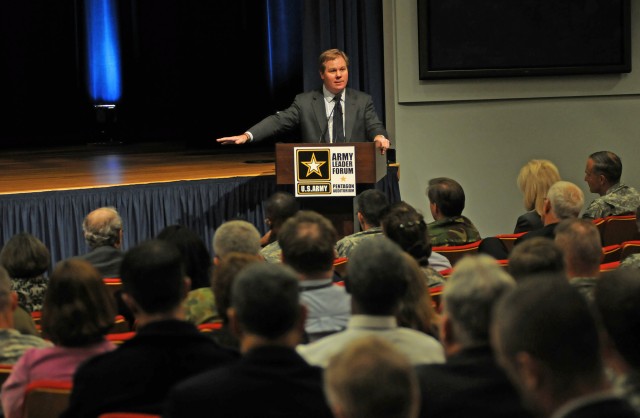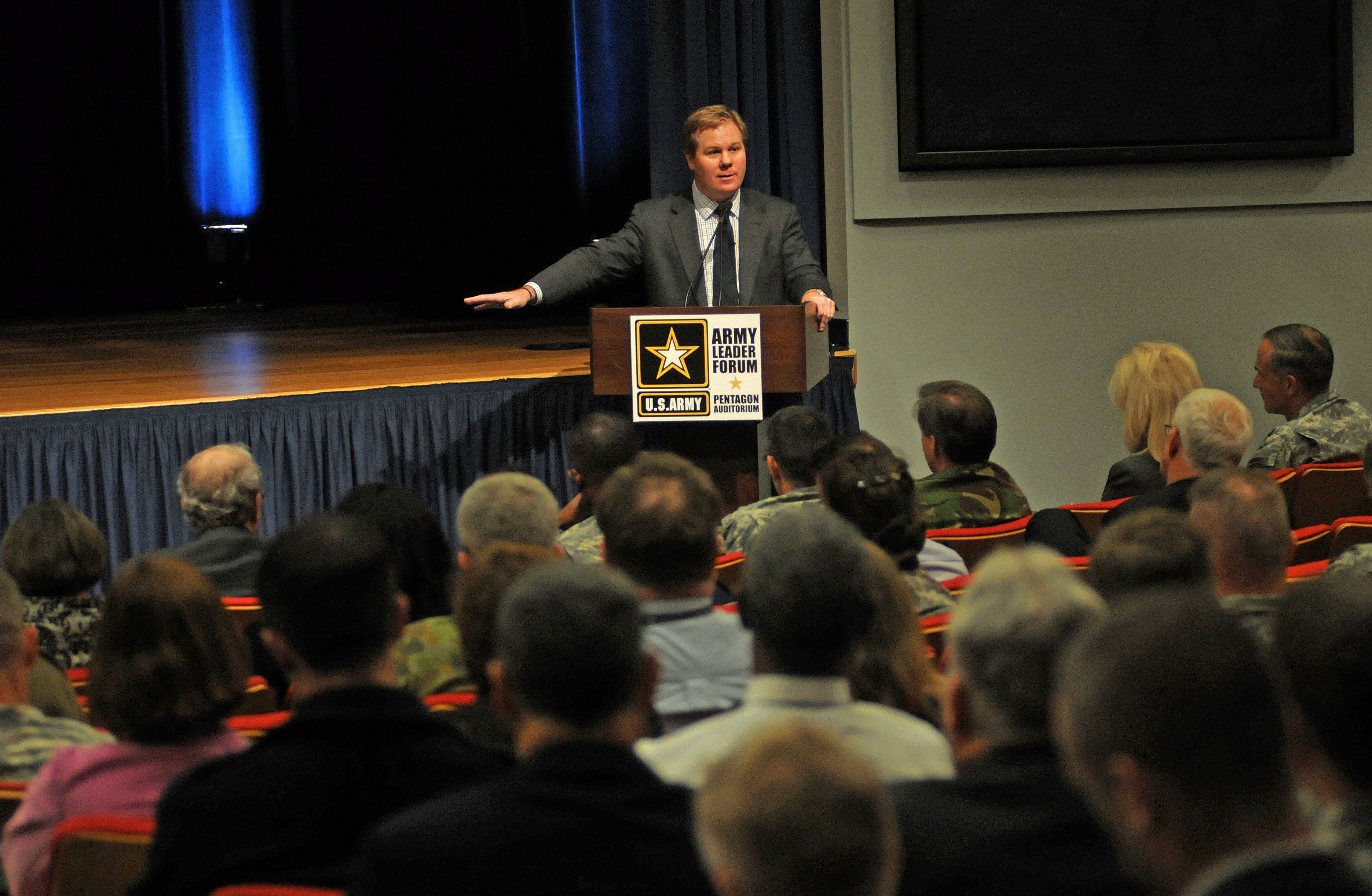WASHINGTON (Army News Service, Oct. 26, 2009) -- Two million troops could be sent to Afghanistan and not make a difference unless the government there reforms, a globally recognized authority on counter-insurgency told a standing-room-only Pentagon audience last week.
Author of "The Accidental Guerilla: Fighting Small Wars in the Midst of a Big One," David Kilcullen spoke to a forum of Army leaders in the Pentagon auditorium Oct. 19. Kilcullen, who serves with the State Department, was senior counter-insurgency advisor to Gen. David H. Petraeus when he commanded Multi-National Force-Iraq in 2007-2008.
Since the Afghan election, Kilcullen said the government there has been "hemorrhaging legitimacy on a day-by-day basis." Until that problem is solved, he said the question of how many troops to send is meaningless in the long term.
"The insurgents are trying to figure out who is going to be in charge when we leave and they're struggling to be the ones who are in charge," he said. "They don't have to defeat the coalition, the counter-insurgent to win, all they've got to do is survive long enough and have enough political control left at the end of the conflict that they can beat any local, indigenous challenger when we pull back."
To that end, the retired Australian Army officer believes the U.S. needs to win militarily in the next two years because within three years Dutch and Canadian troops will be pulling out and followed possibly by the British.
"There are all these different governments saying if you don't get it right in the next year or two, we've got to bail and that's fair enough," Kilcullen said. "We've got to demonstrate we can do this thing militarily in the next couple of years. If we don't do that, we should start downsizing and getting out, but if we do succeed in stabilizing the environment, then we're in transition."
He said the transition phase would take about three years whereby the Afghan government could basically handle the Taliban on its own, provided the U.S. continued to provide air support, intelligence-gathering and some logistics. He referred to it as an overwatch posture that could go on for another five years and longer with not a lot of boots on the ground.
Kilcullen also said the previous administration took a counter-terrorist strategy and approach focused on al-Qaeda, something that hasn't worked. Nor will it work, he said.
"This strategy of doing the absolute minimum of counter-insurgency and just focusing on al-Qaeda counter-terrorism is how we got here, so continuing to do that is not going to work," he said. Kilcullen added that International Security Assistance Force/U.S. Forces-Afghanistan commander Gen. Stan McChrystal, "probably the world expert at find, fix, finish, exploit and assess, the counter-terrorism fusion ops cycle" believes a different strategy is needed that is not CT oriented.
He said in August at a commander's conference, the approach to Afghanistan was geared toward a six- or 12-month window, but a long-term counter-insurgent approach is what's needed.
Kilcullen stressed that the Taliban's strategy has a long-term approach of discrediting the Afghan government, exhausting it, then inheriting what is left.
He said all insurgent movements have four basic tactics: provocation, intimidation, protraction and exhaustion. Most Soldiers who have been on the ground in Afghanistan and Iraq have seen those tactics in infinite variations, he said.
Provocation is used on the government, occupying force or counter-insurgent to force them to take some kind of action that alienates the population.
Intimidation is used to terrorize community members who are inclined to work with the government.
He said protraction occurs when insurgents go quietly, moving out of the way whenever the pressure gets too high or they are unable to operate any longer.
"The approach is standard operating procedure because insurgents are fluid by not having fixed positions, capital cities, major supply dumps or other logistical or political installations they need to guard," he said.
"The final one is the exhaustion tactic and it's essentially one of attrition; it's imposing such costs on the counter-insurgent or the government, people just get tired of paying those costs and go away," he said. "And, in fact that's the tactic which al-Qaeda is applying worldwide and it's the tactic which I think the Taliban is applying in Afghanistan."
He cited the cost of setting up meetings between U.S. and key local community leaders: the security measures, potential to lose lives, hours of preparation, movement, reconnaissance and convoy security.
"These sorts of things have to happen just to have a half-hour meeting with some guy who may or may not produce a result, and that's happening every day all over a theater where we're engaging in counter-insurgency which is why it's so expensive," he said. "It's damn expensive to run those kind of operations and conversely quite cheap to be an insurgent."
As one of the authors of the Army Field Manual 3.24 (counter-insurgency field manual), Kilcullen said there are three key factors on how a counter-insurgency is run - the nature of the state you're trying to support, the nature of the insurgent you're fighting and the nature of the society or population where you're fighting. He said those three factors taken together determine what is appropriate when conducting counter-insurgency operations.
"Theirs is no single set of techniques that work in a counter-insurgency environment ... so you've got to go in there and tailor specific approaches to deal with the insurgent that you find yourself fighting," he said.
Kilcullen said in a about 80 percent of the cases, the government defeats the insurgents due to two factors: the government is fighting on its own territory without a third party intervening and secondly, they're willing to make political deals with the insurgency.
The archetype of a successful negotiated end to a counter-insurgency is something that looks like the Good Friday agreement in Northern Ireland with the British Army. In that case, Kilcullen said, the insurgents agreed to put their weapons down and ceased using violence in return for a seat at the table and participation in the political process.
"Governments that don't want to negotiate or governments that don't show a willingness to allow insurgents to become former insurgents and join the political process don't tend to succeed against insurgencies," he said.
"Counter-insurgencies win slowly," Kilcullen added. "It takes a long time; things are often not what they seem, but it is the face of current and future warfare, so it's worth thinking about and trying to understand as we conduct these operations in Afghanistan and Iraq," he said.


Social Sharing